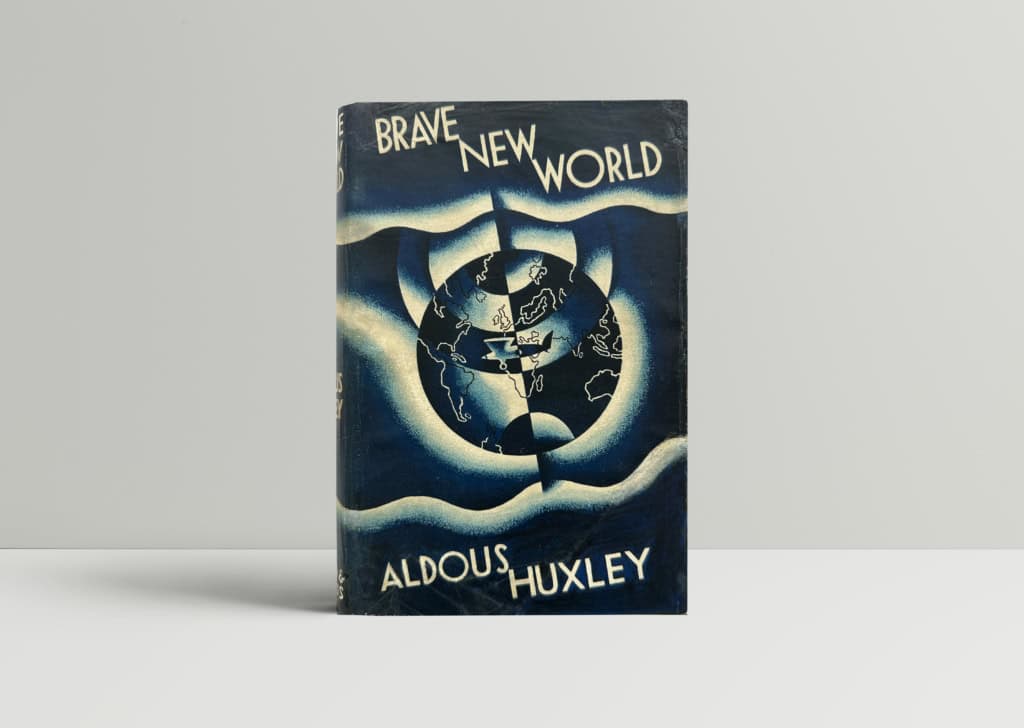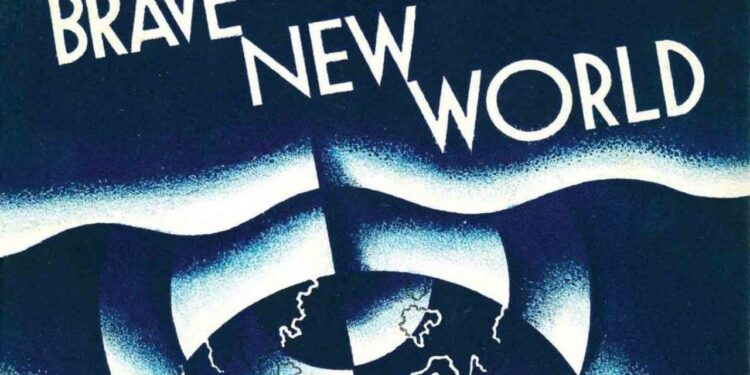Table of Contents
ToggleIntroduction
Brave New World Summary By Aldous Huxley New World, written by Aldous Huxley in 1931, is a classic work of dystopian literature that explores the darker aspects of societal control, technological advancement, and the loss of individuality. The novel presents a future world where humans are no longer born naturally but are instead created and conditioned in artificial wombs by a scientific elite. This world is governed by a rigid caste system, advanced genetic engineering, and the suppression of personal freedom for the sake of stability and happiness. It is often regarded as a critique of the overreach of technology, the dehumanization that can arise from too much societal control, and the ways in which consumerism, conformity, and pleasure-seeking behavior can erode authentic human experiences and values.Brave New World Summary By Aldous Huxley
Set in the World State, a highly organized, scientific society in which people are genetically engineered, conditioned for their roles, and kept content with mass-produced pleasures, Brave New World depicts the consequences of a world where individual thought, art, love, and morality have all been sacrificed for the sake of social stability.
The novel revolves around the lives of several central characters, including Bernard Marx, an Alpha-plus caste member who feels out of place in the highly controlled world; Lenina Crowne, a Beta-plus who represents the conformity of the World State’s consumer-driven society; and John, the “Savage” who was raised outside of this controlled world and whose presence challenges the values of the society.Brave New World Summary By Aldous Huxley
Read More
Plot Summary
The World State and Conditioning
Brave New World Summary By Aldous Huxley The novel opens with the Director of Hatcheries and Conditioning showing a group of students how human beings are created and conditioned in the World State. In this future society, human reproduction is entirely artificial. Embryos are cultivated in hatcheries, where their roles in society are decided according to genetic design. People are not born but instead decanted from artificial wombs and are assigned to one of five castes: Alphas, Betas, Gammas, Deltas, and Epsilons. The Alphas are the highest caste and hold the most prestigious jobs, while the Epsilons are the lowest and work in menial labor. Each caste is genetically engineered to have a specific set of abilities and desires, ensuring that they are content with their predetermined roles.
The process of conditioning begins as soon as the embryos are “decanted.” People are conditioned through hypnopaedia (sleep-teaching) and Pavlovian-style responses to be happy with their lot in life, and they are discouraged from individual thought or dissent. For example, people are taught to associate pleasure with material consumption and are conditioned to avoid pain and discomfort. The citizens of the World State are encouraged to indulge in mindless pleasures such as soma, a drug that eliminates anxiety, stress, and unhappiness, ensuring that no one ever feels the emotional weight of personal responsibility or discomfort.Brave New World Summary By Aldous Huxley
Bernard Marx and Lenina Crowne
Bernard Marx, an Alpha-plus who works as an assistant to the Director of Hatcheries and Conditioning, is uncomfortable with the society in which he lives. Unlike the majority of the World State’s citizens, Bernard feels alienated due to his smaller stature (a result of a genetic flaw), his dissatisfaction with mass consumption, and his desire for individuality. He struggles to fit in, often feeling awkward and out of place, especially around his co-worker Lenina Crowne, a Beta worker who embodies the superficial happiness the society promotes. Lenina is attractive, enjoys casual sex, and regularly takes soma to maintain her happiness, and she is disturbed by Bernard’s introspective nature and refusal to conform to the cultural norm of promiscuity. Bernard, on the other hand, is repelled by the lack of depth in Lenina’s character and is more interested in genuine emotional connection than in the hedonistic pleasures of the society.Brave New World Summary By Aldous Huxley
Despite their differences, Bernard and Lenina go on a trip to the Savage Reservation in New Mexico. The Savage Reservation is a place where people live in a way that is considered primitive and uncivilized by World State standards, maintaining traditional ways of life without genetic engineering or conditioning. While at the reservation, Bernard and Lenina meet John, the son of a former World State citizen, Linda, who was stranded at the reservation years earlier.

John the Savage
John, often referred to as “the Savage,” was born in the traditional manner, to parents who had lived outside the controlled world of the World State. His mother, Linda, had been a member of the World State who had been stranded at the reservation, where she gave birth to John. John grew up reading Shakespeare and learning about the values of individualism, love, suffering, and self-sacrifice. His knowledge of these ideals makes him profoundly different from the people Brave New World Summary By Aldous Huxley of the World State, who have been conditioned to reject such concepts as meaningless and dangerous.
John is brought back to the World State with Bernard and Lenina, where he becomes an object of curiosity for the people who have never seen someone like him. He becomes increasingly disillusioned with the society he encounters. Unlike the passive, conformist citizens of the World State, John refuses to accept the shallow pleasures of the culture. His disgust with the society grows as he witnesses the hollowness of the people’s lives and their inability to understand or appreciate genuine human emotions like love and grief. He is especially repelled by the casual, emotionless sexual encounters that define relationships in the World State.Brave New World Summary By Aldous Huxley
John’s Rebellion and the Collapse of the Ideal Society
John’s presence creates a spectacle in the World State, as he is both an outsider and a symbol of an older, more authentic way of living. However, his inability to fit into the society leads him to an emotional breakdown. In a tragic and ironic turn, John seeks solace by isolating himself from society in a secluded building, attempting to live a simple, self-sufficient life away from the distractions of civilization. However, his attempt to live authentically is thwarted by the society’s relentless pursuit of pleasure. News of his existence becomes a media sensation, and crowds of people come to watch him in his attempts at asceticism, mocking his efforts.
Eventually, John’s resistance to the World State’s ideals reaches its breaking point. After a series of events, including Lenina’s attempt to seduce him and the resulting emotional turmoil, John is left devastated. In the final, tragic scene of the novel, John takes his own life, symbolizing the ultimate rejection of a society that demands conformity at the cost of individuality and true emotional depth.Brave New World Summary By Aldous Huxley
Major Themes in Brave New World
- The Dangers of Totalitarianism and State Control
- One of the key themes of Brave New World is the critique of totalitarianism, where the government exerts complete control over all aspects of life, from reproduction to emotional responses. The society in the World State uses scientific and psychological manipulation to suppress free will, individuality, and personal freedoms in favor of stability and uniformity. The result is a society in which people are superficially happy but emotionally barren.
- The Loss of Individuality
- In the World State, individuality is a threat to social order. People are conditioned from birth to accept their roles without question, and personal desire or ambition is discouraged. The novel highlights the dangers of a society that erases personal identity in favor of collective happiness. The character of John the Savage represents the ideal of individuality and the tragic consequences that come from trying to assert one’s own identity in a conformist world.
- The Role of Technology in Society
- Huxley critiques the unchecked advance of technology and science in Brave New World. In the World State, technological advancements are used to control and manipulate every aspect of life, including reproduction, education, and social relations. The novel warns against the dehumanizing potential of technology when it is used to oppress or commodify human beings, reducing them to mere cogs in a machine.Brave New World Summary By Aldous Huxley
- The Illusion of Happiness
- Brave New World questions the true nature of happiness. The people in the World State are conditioned to be content through consumption, sexual pleasure, and the use of soma, a drug that numbs their emotional responses. However, the novel reveals that this type of happiness is shallow and artificial. True happiness, the novel suggests, comes from freedom, individuality, and authentic human experiences, not mindless pleasure-seeking.

- The Role of Art and Literature
- Brave New World explores the role of art and literature in society, illustrating how a society that seeks to maintain stability through control must suppress the imagination. John the Savage, who grows up reading Shakespeare, represents the power of literature and art to challenge societal norms and inspire critical thinking. In contrast, the people of the World State are denied access to deep or thought-provoking cultural works, as they would undermine the peaceful conformity that the state seeks to preserve.Brave New World Summary By Aldous Huxley
Read More
Conclusion
Aldous Huxley’s Brave New World remains a powerful and relevant exploration of the potential consequences of technological and societal advancements that seek to control human behavior and emotions. Through its portrayal of a world that has sacrificed individuality and authentic experiences for the sake of stability and happiness, the novel raises important questions about the value of freedom, the role of technology, and the true nature of happiness in modern society.
(FAQ)
1. What is the significance of the title Brave New World?
The title of the novel is a reference to a line from Shakespeare’s The Tempest, in which the character Miranda exclaims, “How beauteous mankind is! O brave new world that has such people in’t!” In the novel, the phrase is used ironically, as the “brave new world” of the future is actually a highly controlled, dehumanizing society.
2. What is soma, and why is it important?
Soma is a drug used in the World State to keep people placid and content. It is a symbol of the society’s superficial happiness and the way that it uses pleasure to control its citizens. Soma prevents people from experiencing negative emotions like sadness, anger, or frustration, ensuring that they remain satisfied and complacent.
3. What happens to John the Savage at the end of the novel?
At the end of the novel, after being exposed to the superficial pleasures and corruption of the World State, John becomes disillusioned with society. He withdraws from the city to live in isolation, but his attempts at creating a meaningful life are thwarted by the public’s fascination with his presence. Unable to bear the emptiness of the world around him, John ultimately takes his own life.
4. How does Brave New World compare to 1984 by George Orwell?
Both novels are dystopian works that explore totalitarian regimes and the loss of individual freedom, but they approach the topic in different ways. 1984 focuses on oppressive political control, surveillance, and the suppression of free thought through fear and violence. In contrast, Brave New World presents a society that controls people through pleasure, conditioning, and the eradication of individuality, making it a more insidious and less immediately recognizable form of control.
5. What is the role of science in Brave New World?
In Brave New World, science is used primarily as a tool for societal control. Genetic engineering, hypnopaedia (sleep-teaching), and behavioral conditioning are all employed to maintain the stability of the World State. The novel critiques the unchecked application of science when it serves the interests of power rather than human well-being.
Read More
















